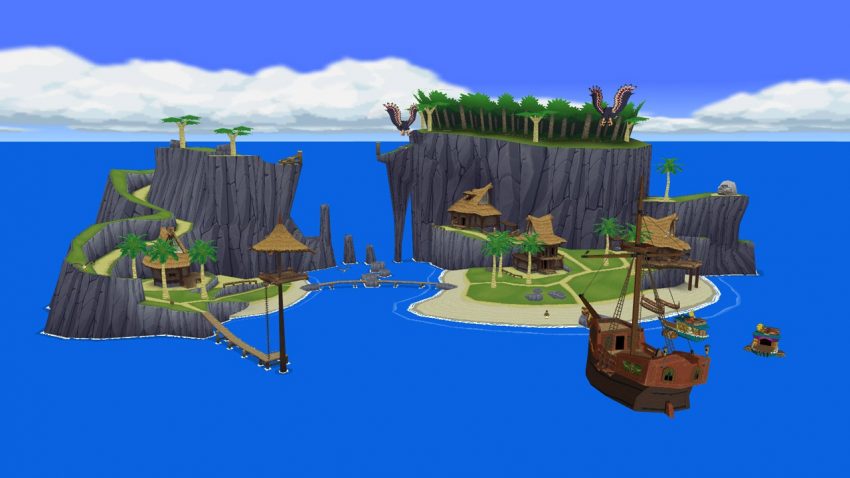Storytelling Through Sound: The Nautical Nature of The Wind Waker’s Main Theme
Posted on August 24 2023 by Connor Butler
Welcome back to another edition of “Storytelling Through Sound,” a series of editorials dedicated to the analysis of the main themes from every Zelda game. In honor of Wind Waker Week, we’ll be taking a look at the game’s nautical main theme and discussing its various musical elements.
Every time I start The Wind Waker again, I always take a minute to sit and listen to the title theme again. The scenery of Outset Island paired with this beautiful music always hits me in the feels, as I’m sure it does for a lot of you. For the limitations that the GameCube’s sound chip had, there were some beautiful pieces of music created on this console. Even though it’s simple, the main theme of The Wind Waker is a wonderful storytelling tool, and it does a good job of sticking with the bare bones of the story.
Structure

Unlike some of the other games in the franchise, The Wind Waker‘s main theme is quite short, but it still packs an emotional punch. Because it is so short, the story and symbolism aren’t as clear as they are in, say, Tears of the Kingdom. This being the case though, it still does a great job. The opening contains a simple beat from some large sounding drums that play in a time signature known as 6/8, which gives it that bouncing, sea shanty feel. This beat continues throughout the entire piece and gives it that pirate-y, oceanic feel that encapsulates the seafaring adventure that you’re about to embark on.
The beginning also contains this simple little four-note line that continues throughout the rest of the song. It’s hard to tell what instrument this is supposed to be, due to the MIDI sounds on the GameCube being completely synthesized, but it sounds to me like a guitar or a lute. Fitting, as these are portable instruments that can be taken on a ship across the sea. This four-note line is always the tear-jerker for me; I’m not sure why, but it hits me right in the nostalgia.
We then get a pan flute line that is accompanied by strings, and that melody is, to me, the absolute essence of the game. I love this melody, and it gets stuck in my head all the time. With the added in-game significance (which we’ll talk about later), this melody remains incredibly special to me, and hopefully to the rest of the people who played this unforgettable title. We then get another section, this time played on a violin. This melody bounces off of ideas from the initial melody, but is just as catchy. The piece then loops, for the sake of video game continuity. Like I mentioned before, it’s simple, but effective.
In-Game Quotes (And Korok Fun)

For those of us with keen ears and decent memory, you’ll realize that this title theme is more than meets the… ears? The main theme is beautiful and catchy, yes, but there’s more. The first section with the pan flute plays the melody of “The Earth God’s Lyric,” which is used in game to unlock certain doors in the Earth Temple, as well as to power up the Master Sword after you defeat Jalhalla. This magical, little ditty is usually played on Medli’s harp, but if you listen to the in-game soundtrack, the second time through, it is played in the background by the title theme’s pan flute.
The second section, of course, is played by a violin, and the melody is borrowed from “The Wind God’s Aria,” the tune used by Link to get into various doors in the Wind Temple, as well as to finish powering up the Master Sword after defeating Molgera. This wonderful, bouncy tune is played by Makar’s violin both in the title theme and in the game.
Back to the title theme, there are a bunch of background voices that can be heard behind the repeat of both melodies. While it’s a little hard to be certain what instrument is being played underneath, to me, it almost sounds like the sample used to represent the voices of the Koroks as they sing to the Deku Tree after you save Forest Haven. It’s a cute, little easter egg, but again, I’m not entirely sure.
Conclusion
This game is one of my absolute favorites, and its main theme is no different. Its sound perfectly encapsulates the nautical adventure that you embark on in-game. The inclusion of both “The Earth God’s Lyric” and “The Wind God’s Aria” not only help tell the story of the main game, but also help tie together this game’s musical undertones. While you are the Hero of Winds, and a warrior of the Goddesses, you are also a conductor, one who can conduct the instruments of the Gods, and this theme helps us remember the musical sides of this adventure.
In addition to all the ocean-themed fun that this piece puts forth, the instrumentation of the theme makes it sound like something that could be played as a celebration piece on Tetra’s pirate ship. All of the instruments are small, portable ones that could fit on a boat, and the fast and dance-like tempo makes it sound like the whole crew is gathered on the top deck, dancing the night away. I adore this piece of music, and I adore this game. Hopefully now you have a deeper appreciation for the music of The Wind Waker, and the next time you play it, you can listen for these little nuances.
What do you think? Does The Wind Waker‘s main theme sound like the oceanic adventure of a lifetime? Let us know in the comments!

Connor is an avid Zelda fan and Musician currently obtaining his degree in percussion performance from Western Carolina University. His favorite game in the Zelda franchise is a toss up between Breath of the Wild and Ocarina of Time, but he has a soft spot for the Wind Waker.




